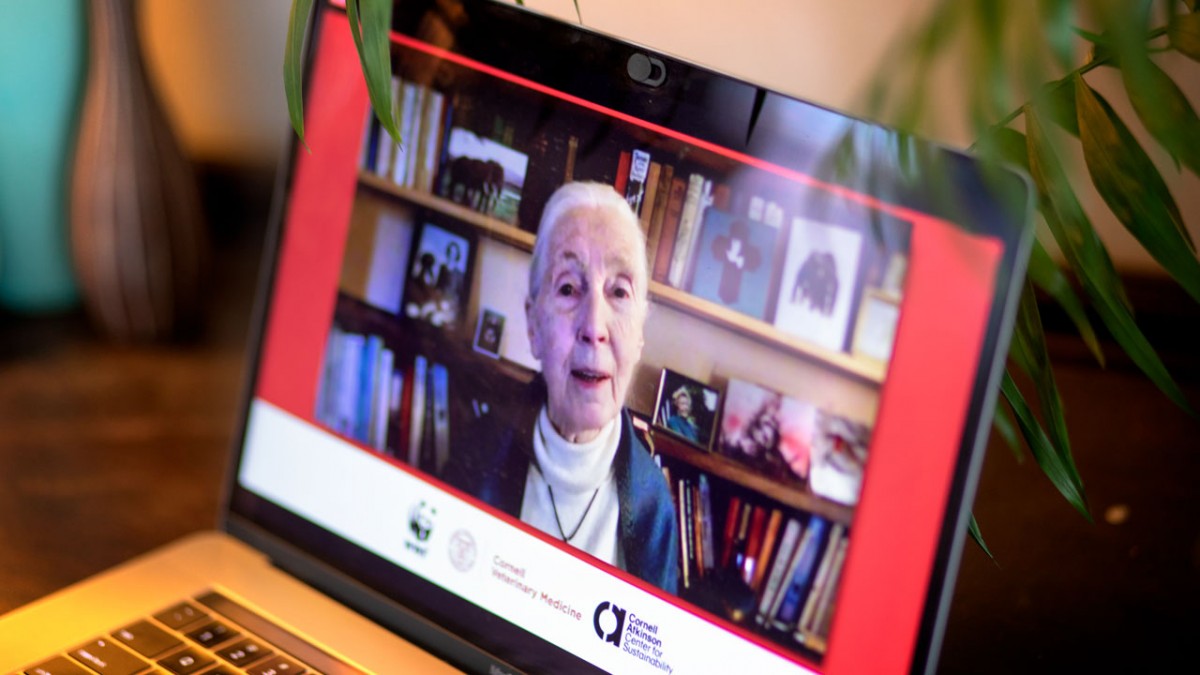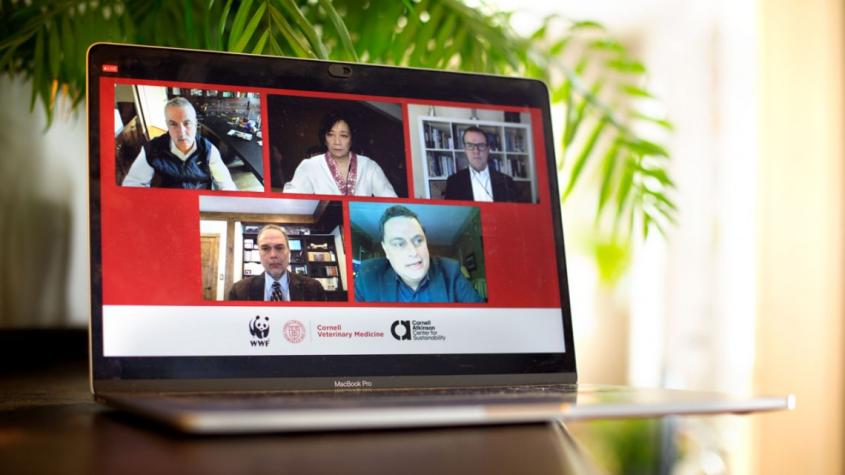Wildlife regulation, ‘one health’ keys to avert more pandemics
Future pandemics can be averted if the United Nations and the world’s governments move to eliminate unnecessary wildlife trade and consumption, and then promote a holistic “one-health” approach focused on tearing down scientific and organizational silos, according to global experts speaking at the Feb. 23 virtual conference, “Emerging Disease, Wildlife Trade and Consumption: The Need for Robust Global Governance.”
The experts tied together seemingly disparate factors and global conditions –wildlife markets, societal inequities and human incursions into what’s left of wild nature – that contribute to pandemics.
Hosted by Cornell’s College of Veterinary Medicine, the World Wildlife Fund and Cornell Atkinson Center for Sustainability, the webinar was moderated by journalist Thomas L. Friedman of The New York Times, with keynote remarks by conservationist Dr. Jane Goodall.

Naturalist Jane Goodall ends the conference by summarizing key points. “Everything on this planet is interrelated,” she said. “And we ignore that at our peril.”
“As a wildlife veterinarian, [I am] focused on how the health of wildlife, the health of domestic animals and our own health are all inextricably linked together and intimately connected with the health of our environment,” said event organizer Steve Osofsky, Jay Hyman Professor of Wildlife Health and Health Policy at the veterinary college, and director of the Cornell Wildlife Health Center.
“The coronavirus pandemic was preventable; it was not a surprise,” Osofsky said. “It was predictable – and it was predicted.”
Nik Sekhran, chief conservation officer of the World Wildlife Fund (WWF), told an online audience of nearly 3,000 people that more than 60% of emerging infectious diseases in humans originate in animals, and that more than 70% of those come from wildlife.
“We’ve witnessed a staggering 68% average decline in wild populations of vertebrates, mammals, birds, reptiles, amphibians and fish since 1970,” Sekhran said. “Our wildlife is under significant pressure. A major source of that pressure is the trade, legal and illegal, in wildlife, and this is estimated to be worth over $20 billion a year annually.”
The conference also brought together:
- David Nabarro, the World Health Organization special envoy on COVID-19;
- Doreen Robinson ‘92, chief for wildlife at the United Nations Environment Program, Nairobi, Kenya;
- Richard Kock, professor of wildlife health and emerging diseases at the Royal Veterinary College, London, and co-chair for the International Union for Conservation of Nature Wildlife Health Specialist Group;
- Theresa Mundita Lim, executive director, ASEAN Centre for Biodiversity; and
- John Scanlon, chair of the Global Initiative to End Wildlife Crime.
To end pathogen-ridden wildlife markets, ripe for promoting the leap of dangerous viruses to humans, Scanlon believes the world needs strengthened international agreements.
“We must hardwire a one-health approach into the international legal framework,” he said, outlining options such as amending the 1973 Convention on International Trade in Endangered Species of Wild Fauna and Flora (CITES) treaty, which focuses on tens of thousands of traded animal and plants species.
Nabarro offered a prescription to keep humans from consuming wild animals. First, keep the United Nations involved, to enhance nations’ commitments to continue working together. Next, urge universities to develop one-health education platforms to ensure that veterinary and human health centers work in teams. Finally, recognize and address the fact that wildlife consumption increases chances of pathogen emergence.
Pandemic risk is closely tied to a complex global food system, Robinson said.
“We’re gobbling up plants, animals and other natural resources faster than any time in human history,” Robinson said. “And as we devour, we degrade and alter ecosystems, destroying nature's life sustaining services.”
Kock said reducing meat consumption by 75% would release huge amounts of land.
“We can go back to having chicken on Sundays,” he said, “And not [having meat] every day of the week.”
David Lodge, the Francis J. DiSalvo Director of Cornell Atkinson, told conference attendees that his center advances a One Health program. “We need a one-health effort [worldwide] that is permanent, institutionalized, coordinated, global and systemic,” he said. “An effort that is commensurate with a dramatically increased ‘flatness’ (meaning connectivity) of the world that [conference moderator] Tom Friedman reminded us of today.”
Osofsky also said there is cause for hope: “Perhaps a tiny, invisible virus (COVID-19) will be what actually, hopefully tips the scales toward a critical mass of global understanding of the fact that our own health is intimately tied to how we treat the natural world.”
To end the conference, Goodall echoed Osofsky’s sentiments.
“We’re paying the price for not listening to those scientists studying zoonotic diseases,” she said. “It’s the destruction of environments, pushing animal species closer together, pushing them closer to human habitation that has led to [how] zoonotic diseases can arise. …
“We are disrespecting the natural world,” Goodall said. “Everything on this planet is interrelated. And we ignore that at our peril.”
Written by Blaine Friedlander






